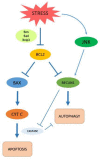Novel Insights into Autophagy and Prostate Cancer: A Comprehensive Review
- PMID: 35409187
- PMCID: PMC8999129
- DOI: 10.3390/ijms23073826
Novel Insights into Autophagy and Prostate Cancer: A Comprehensive Review
Abstract
Autophagy is a complex process involved in several cell activities, including tissue growth, differentiation, metabolic modulation, and cancer development. In prostate cancer, autophagy has a pivotal role in the regulation of apoptosis and disease progression. Several molecular pathways are involved, including PI3K/AKT/mTOR. However, depending on the cellular context, autophagy may play either a detrimental or a protective role in prostate cancer. For this purpose, current evidence has investigated how autophagy interacts within these complex interactions. In this article, we discuss novel findings about autophagic machinery in order to better understand the therapeutic response and the chemotherapy resistance of prostate cancer. Autophagic-modulation drugs have been employed in clinical trials to regulate autophagy, aiming to improve the response to chemotherapy or to anti-cancer treatments. Furthermore, the genetic signature of autophagy has been found to have a potential means to stratify prostate cancer aggressiveness. Unfortunately, stronger evidence is needed to better understand this field, and the application of these findings in clinical practice still remains poorly feasible.
Keywords: apoptosis; autophagy; cancer; castration-resistant prostate cancer; genes; neoplasia; prostate cancer; self-eating.
Conflict of interest statement
The authors declare no conflict of interest.
Figures




References
-
- Abreu S., Sanchez-Wandelmer J., Reggiori F. The Origin of Autophagosomes: The Beginning of an End. In: Wang H.-W., editor. Autophagy and Cancer. Springer; New York, NY, USA: 2013. pp. 47–61.
-
- Degenhardt KMathew R., Beaudoin B., Bray K., Anderson D., Chen G., Mukherjee C., Shi Y., Gélinas C., Fan Y., Nelson D.A., et al. Autophagy promotes tumor cell survival and restricts necrosis, inflammation, and tumorigenesis. Cancer Cell. 2006;10:51–64. doi: 10.1016/j.ccr.2006.06.001. - DOI - PMC - PubMed
-
- Bennett H.L., Stockley J., Fleming J.T., Mandal R., O’Prey J., Ryan K.M., Robson C.N., Leung H.Y. Does androgen-ablation therapy (AAT) associated autophagy have a pro-survival effect in LNCaP human prostate cancer cells? BJU Int. 2013;111:672–682. doi: 10.1111/j.1464-410X.2012.11409.x. - DOI - PubMed
Publication types
MeSH terms
Substances
LinkOut - more resources
Full Text Sources
Medical
Miscellaneous

